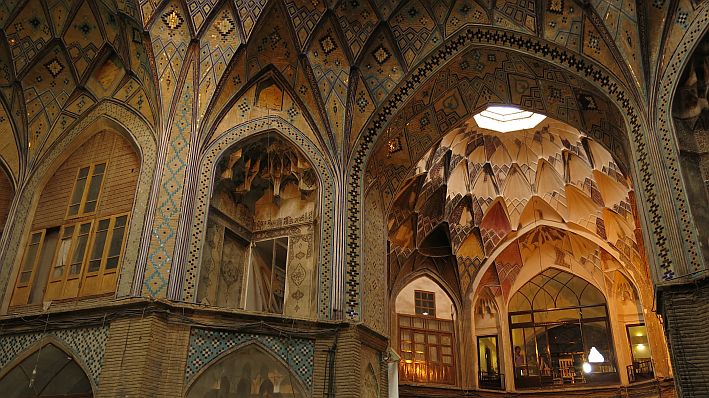
From Qom I continued northeast and made a lot of headway. In the evening, unfortunately, although it was already dark, I had no place to stay. There were open fields everywhere, which are not good places to pitch a tent, and I wasn’t too enamored with the idea of camping in the open.
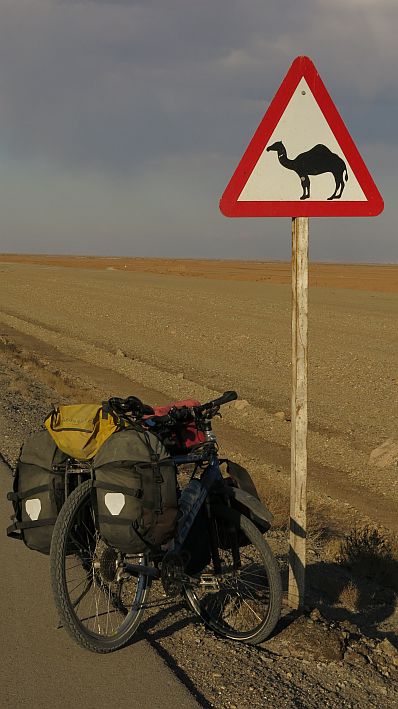
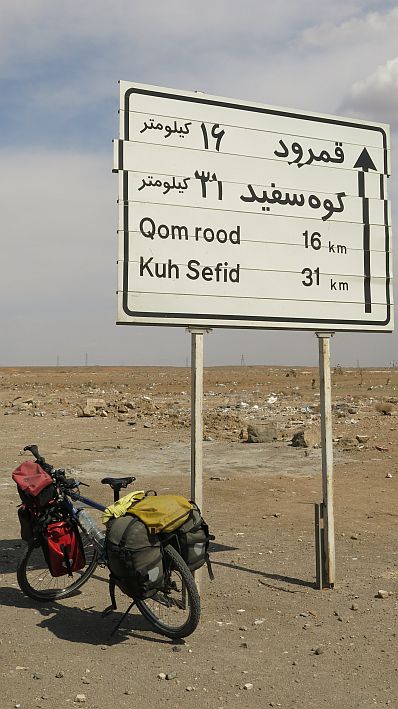
Eventually, I saw some lights and was glad to have found a small settlement. It was the first time I had heard dogs barking, because there are almost no dogs in the country. As a Muslim, you are only permitted to own a dog for protection but not as a pet. At the first house, I asked if I could pitch my tent in the yard.
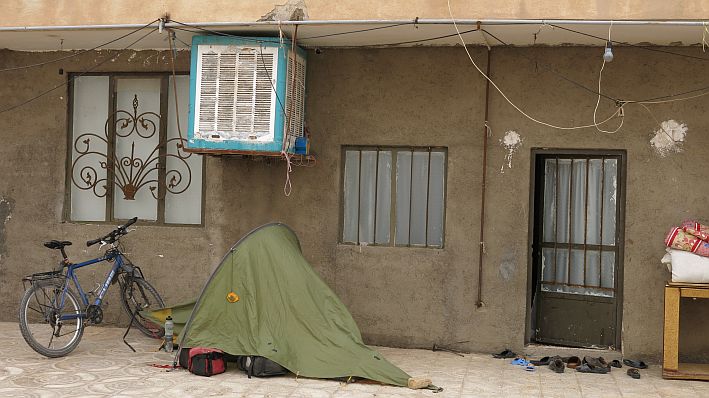
One of the women ran away from me screaming and the others asked me if I was a man or a woman. After a lot of discussion I was finally allowed to camp in front of the house. I was served the obligatory tea in a corner in the hallway. It was the very first time in Iran that I was not allowed to sit with the family. Later, when I was already in my tent, the evening meal was brought to me. The next morning they asked me several times again whether I was a man or a woman.
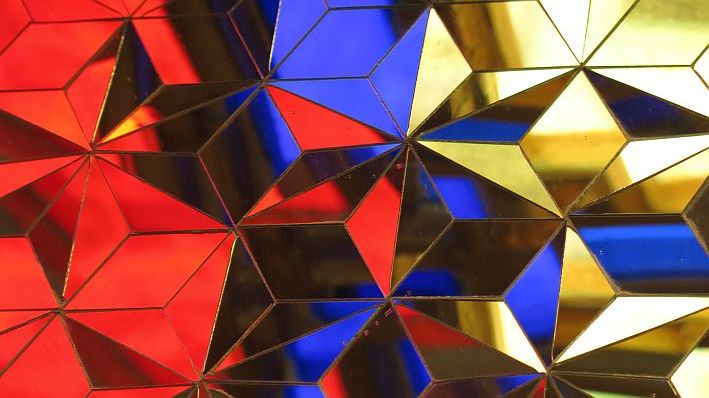
With a stormy wind at my back I was pushed toward the east. I was riding 45 kilometers per hour without having to pedal – it was almost like riding a motorcycle.
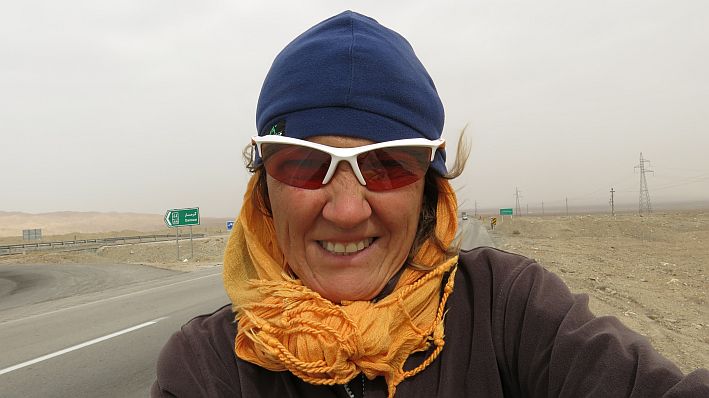
After 174 kilometers, I arrived in Semnan that evening and asked at Helal Ahmar, the Red Cross, about a place to sleep. Unfortunately, understanding each other there was extremely difficult and I didn’t really understand the problem. I waited an entire hour until someone took me to a fancy hotel and made it clear to me that, since they had no room for me, the Red Cross would pay for it.
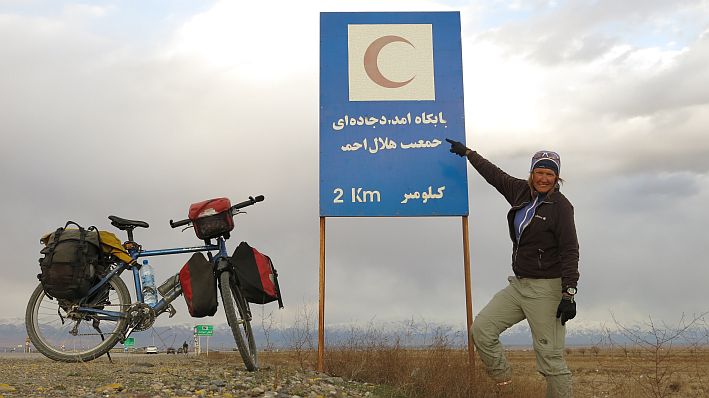
I enjoyed the most comfortable overnight stay since beginning my journey. It included both dinner and breakfast and I was happy as a little child about the hot shower and the cozy bed. I didn’t really understand how all this came about.
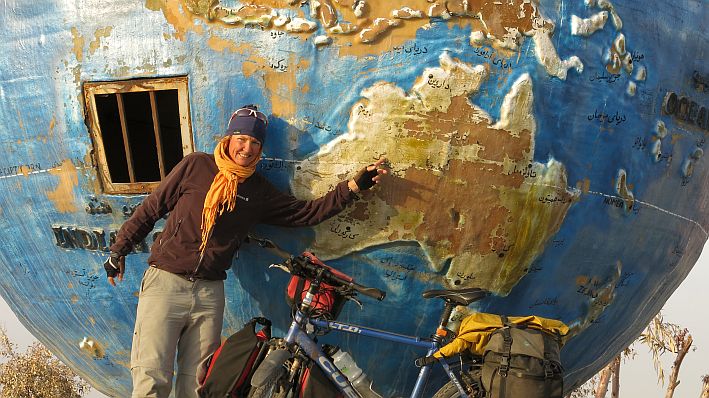
It’s still a long way !!!
The next morning the police came to the hotel. They explained that it was Noo Ruz, the New Year, and since there would be a lot more traffic on the roads than usual, I should not hesitate to load my bike into a car because it would be too dangerous to ride the bicycle. Also, the person who paid for my comfortable room appeared – the manager of Helal Ahmar – to wish me a good journey. He told me that the next Helal Ahmar on my route was in Fulad Mahalleh and that I would be welcome there; at least, that’s how I understood it.
From then on, the route ahead was only uphill. I wanted to go over the mountains to Gorgan and from there, over a longer side route to Mashad – first, because of the landscape and, secondly, to avoid the traffic on the main highway. The first pass was 2300 meters high. Lonely, but great scenery. Though very cold, it was exactly the kind of scenery I liked.
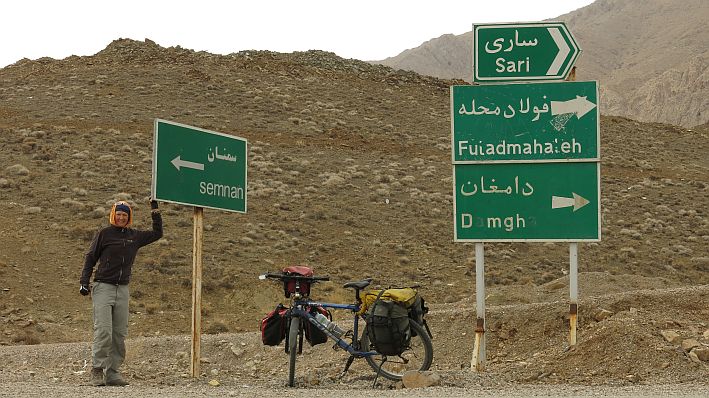
It was already dark when I arrived at the Helal Ahmar.
A cold wind had been whipping around my ears all day long, so I was glad to enter a warm room. I was given a hearty welcome and supplied immediately with tea. A short time later I was told I could not stay there.

Only men were permitted, and as a woman alone, I would not be allowed to spend the night. They offered to drive me to Damghan, 60km away. Damghan was back in the valley and also on the main highway, which I wanted to avoid. No thanks!
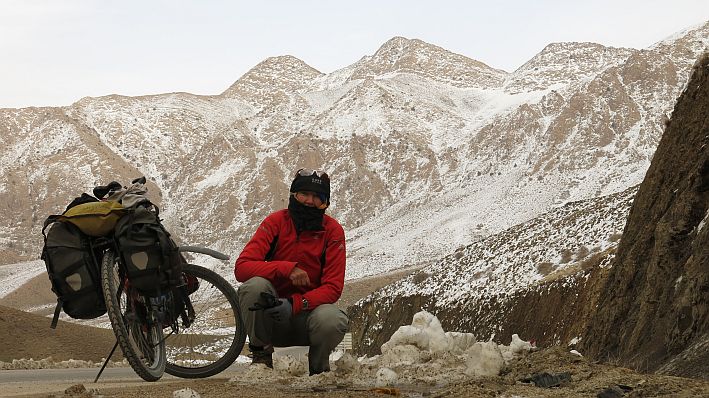
But the wind was brutal and Helal Ahmar was the only building in sight. They made tons of phone calls and kept me in a good mood with tea. Eventually, the police suddenly appeared in the doorway. They wanted to see my passport and my written permission to ride by bicycle through Iran. They explained that without this certificate they would not allow me to continue, and I would have to return to the police station in Semnan.
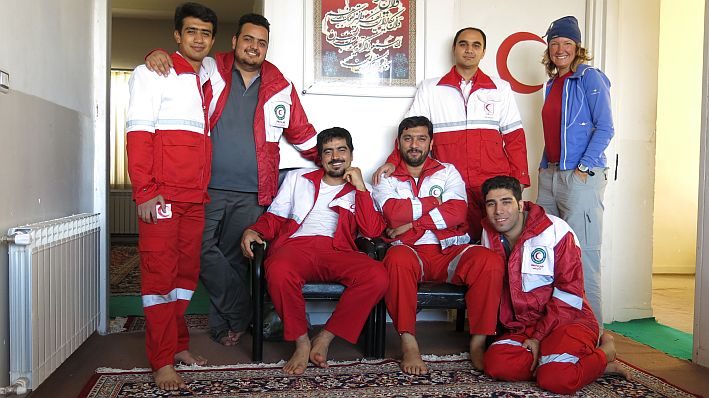
I simply sat down and waited for the problem to pass. After 2 hours, the police finally left, with the understanding that such a certificate wasn’t necessary. By then it was 10 p.m. and the Helal Ahmar people were not willing to relax their rules. Eventually they drove me to the Red Cross building in Damghan. They also promised to pick me up the next morning again, so I would be able to cycle from Fulad Mahalleh.
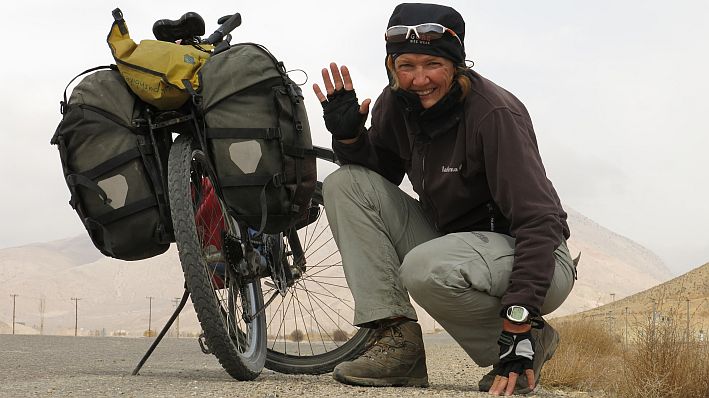
I slept in the prayer room and, as expected and understandable, nobody came the next morning. At least to make the first big ascension back up the mountain, I was able to organize a ride with one of the Red Cross cars.
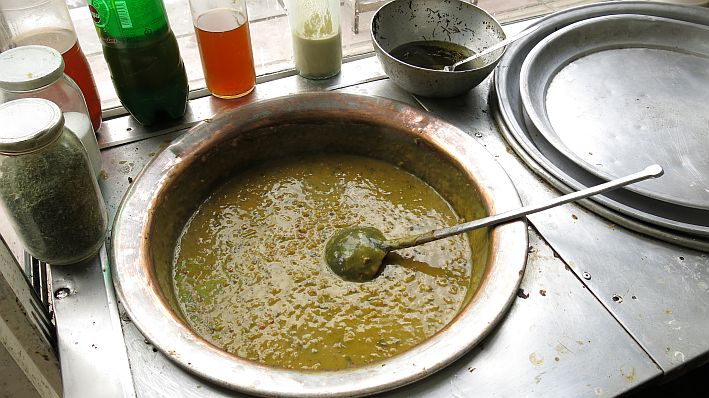
Again I found myself fighting against the wind. It was really beginning to get on my nerves, because as if it were not difficult enough to pedal my way through the world, the wind made life all the more miserable for me.
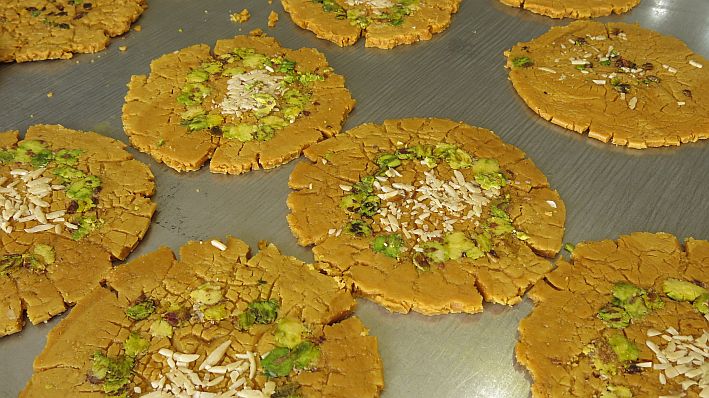
I was also going through a kind of crisis: I felt lonely and I asked myself for hours things like “what am I doing?” and “how beautiful it must be during the springtime at my home in Germany.” I thought about the forests, the beautiful flowers blooming everywhere and my favorite food, which my mother would be serving me right now if I were at home.
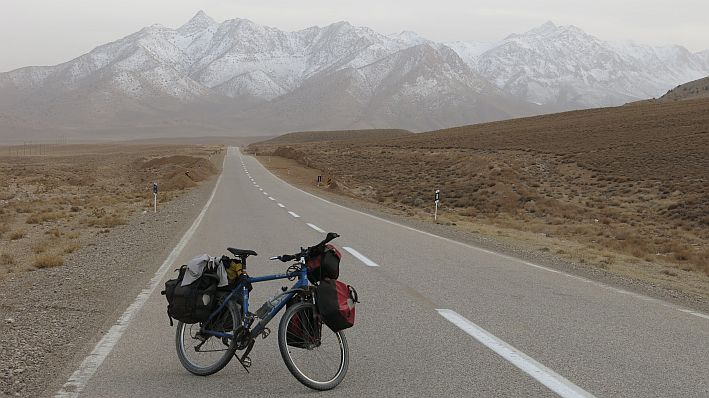
I thought about my friends with whom I would like to spend time again and I questioned every single minute I was riding that day. It could all be summed up in one theme: “What am I doing here, anyway?” To improve my mood, I pulled out my MP3 player and danced in the street to the music of Nena and Falco.
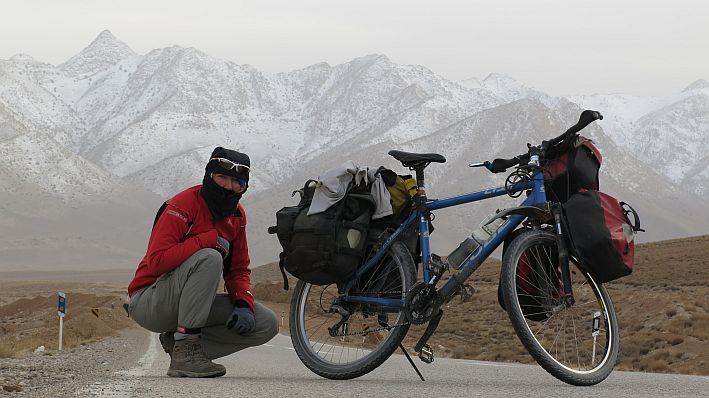
I got as far as Dibaj and my thoughts were interrupted when the police stopped me. “You’re not allowed to continue; the road is too dangerous. There are wild animals ahead and a lot of snow.” They wanted me to go to the police station. At first, I tried to convince them jokingly that I wanted to continue on, but unfortunately, they eventually became upset with me. So I had no choice but to follow the two officers and was detained at the police station. Once again, they made dozens of phone calls.
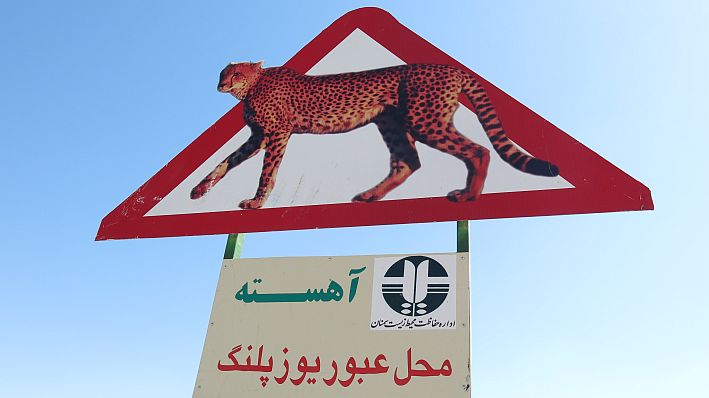
In the late afternoon, I was told to immediately ride back to Damghan and go to the tourist police, who were expecting me there. I said adamantly: “I won’t do that, because in 2 hours it will be dark and I could never make it in time.” Another hour went by and two plain-clothes policemen picked me up and drove me to Damghan. So, there I was again, back on the main road and back again in Damghan. At the police station they asked me every imaginable question. They looked at each of the pictures on my camera, checked all of my cell phone calls, photographed me and copied my passport. Then, sometime later, I was eventually allowed to continue.
I was driven to a pilgrim accommodation not far from Sharud and stayed there overnight. But, because they had detained me, I insisted that the police pay the overnight stay, which they did very grudgingly. They wished me a nice journey for the next day and disappeared.
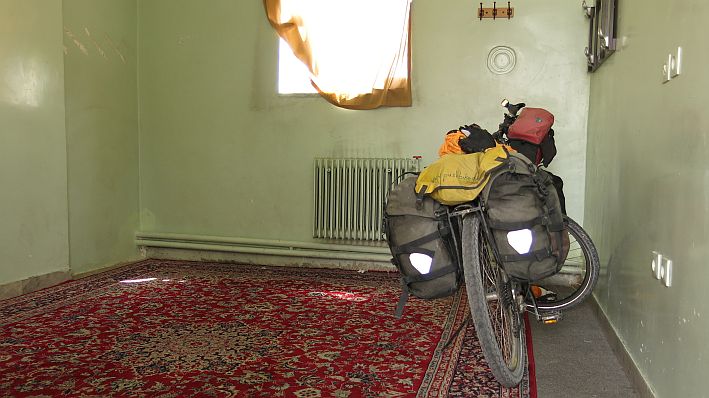
I can say one thing good about them; they were very friendly. I had already heard from other cyclists that they had been checked several times by the police; even Rafael once had the pleasure of dealing with the tourist police.
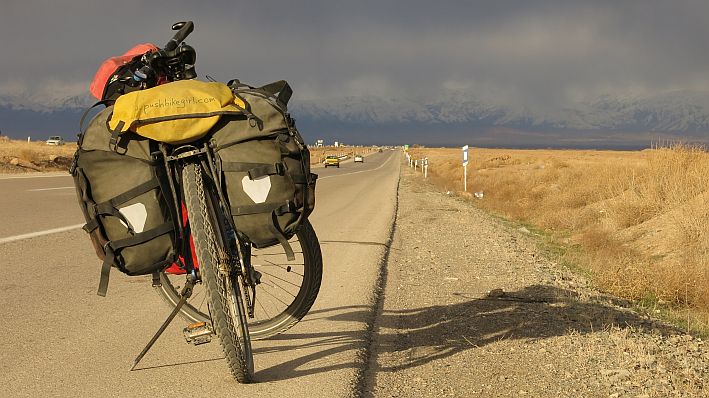
I wondered whether I had perhaps penetrated into an area where I might have seen something I shouldn’t because the officer had asked me the question, “Do you have a spy camera with you?” Or, were they really only concerned about my safety? Unfortunately, I don’t know.
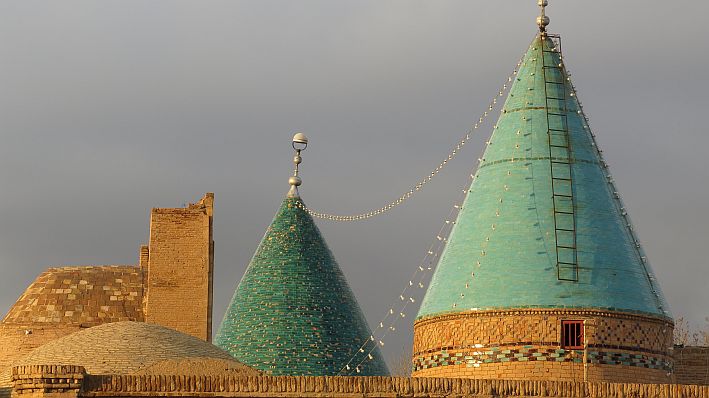
The next day, I had to continue on a totally crowded highway, which was allegedly safer than the dangerous animals in the mountains. By the way, I haven’t seen any wild animals since Poland, and that is no wonder considering the traffic density we now have on our planet. I felt as though I had been penalized and had simply been taken somewhere against my will.
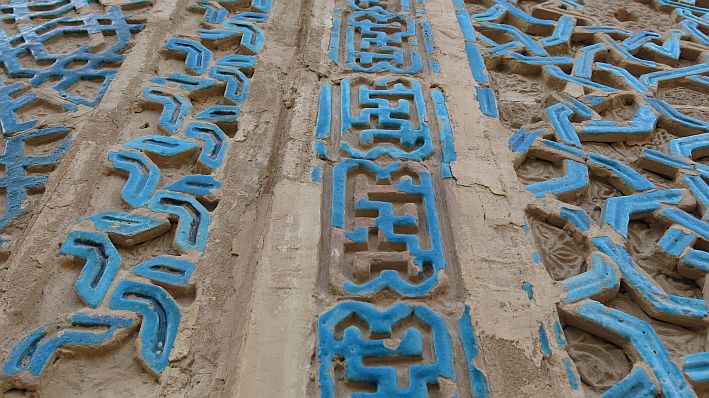
My whole plan was out the window. Besides that, I was beginning to run out of time because I needed to be in Mashad soon to apply for my visa to Turkmenistan. There was no time left to take the side route I had originally planned.
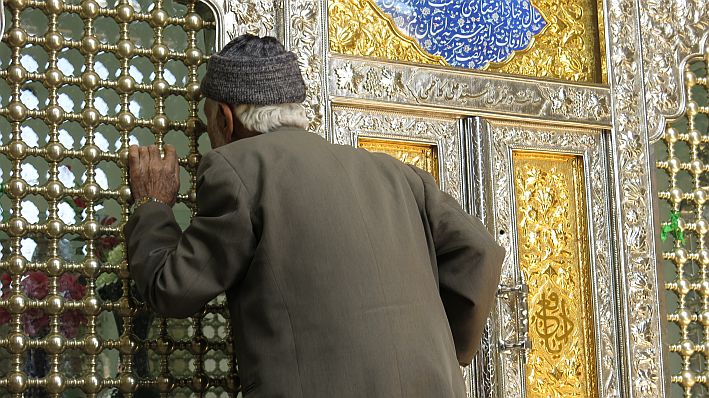
I was in a really bad mood and with every truck that thundered past me, I cursed the police again. I didn’t get far that day. I had lost all desire to ride my bicycle and, in a small town off the main road, I asked if there was a place I could stay. I was very lucky when a super nice family took me in. The daughter spoke good English and the food was delicious.
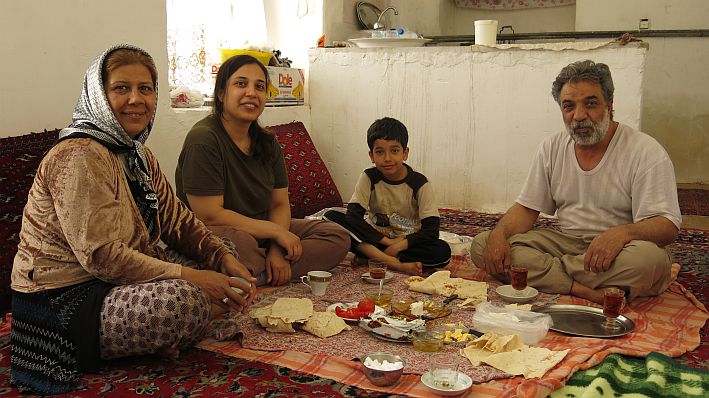
They welcomed me warmly and that evening (21 March 2014 at 8:27 p.m.) we celebrated Noo Ruz, the New Year of 1393, together. There wasn’t much to the celebration. The father gave some money to everyone, the candles on the altar were lit and dozens of people called on the phone to wish them a happy new year.
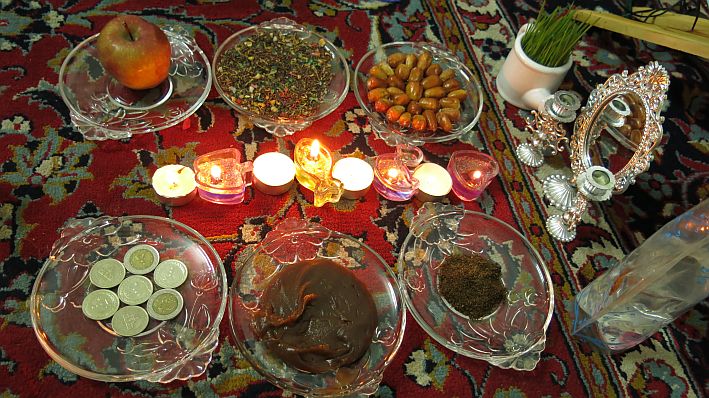
The room was so warm that I occasionally had circulatory problems. Moreover, the mother went twice through the room with some burning, extremely smoky stuff which emptied the room of any residual oxygen. Luckily, I was allowed to sleep in a cold room next to the main room. It is an absolute riddle to me how four people could possibly spend the night in that oxygen-poor, hot room.
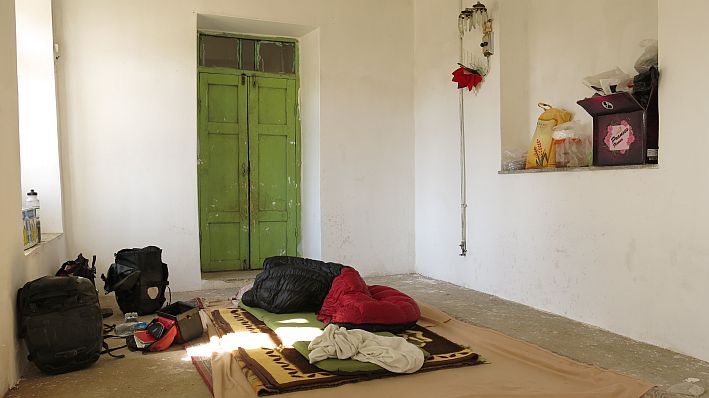
But finally, I was able to take part in real conversation again. The daughter, already 30 years old, was still living with her parents, even though she was an English teacher at the university. There had been several men who were interested in her, but she had not yet accepted any marriage proposals.
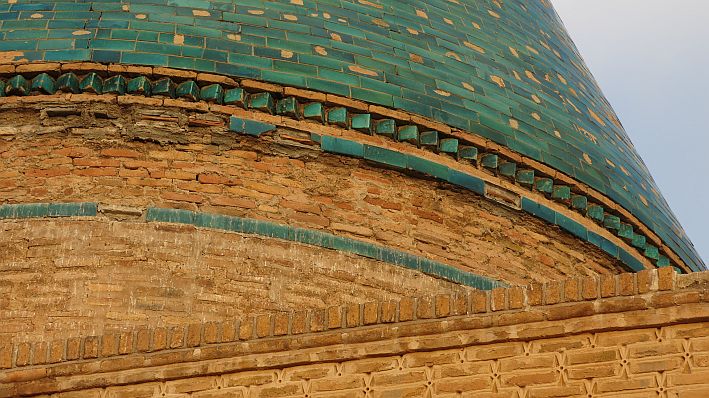
The process of getting to know someone was always the same. Someone would let her parents know about his interest in her. A meeting was then arranged with his parents, her parents and the two of them. They would talk for about 30 minutes and then they would have to decide whether or not they would like to get married. She said her father was very conservative and he would not allow her to meet with any of the men again somewhere alone. For other families, it was handled more loosely, so there would be more time to get to know each other.
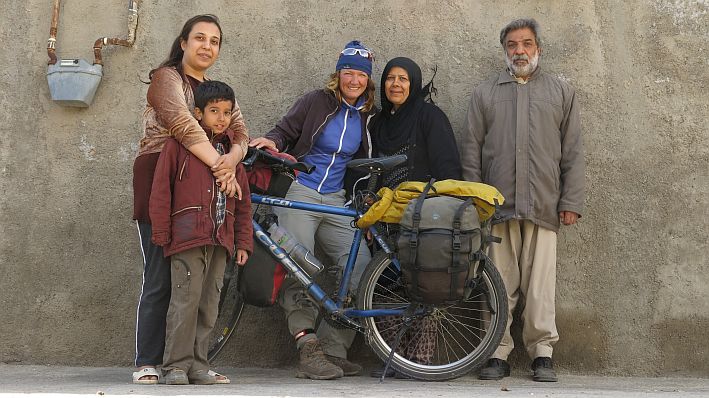
Not only that, she was never allowed to go anywhere alone, except to work. She couldn’t go shopping alone, she couldn’t go alone to visit friends, and she couldn’t even go alone to the door when someone knocked. Her father was always present. She has no private room, no bed and, as you might expect, no closet. She said, however, that she loves her father and would do whatever he says. She was an attractive woman, happy, cheerful, sincere and educated. I simply felt sorry for her and I wondered why a father could believe that such a life is the best thing for his daughter.
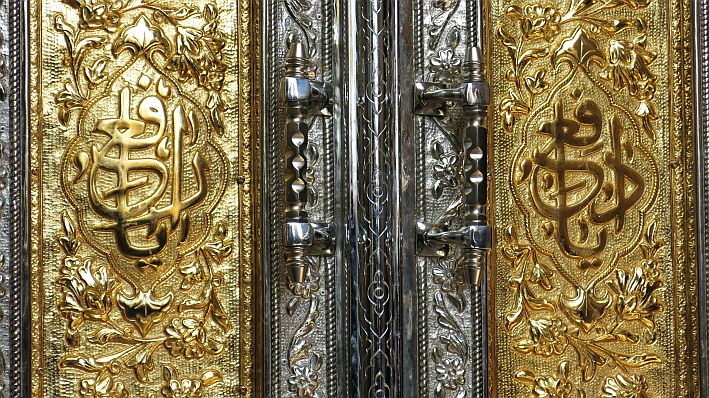
I am so very happy that my parents always say things to me like, “Heike you can do it; Heike, you can make it; Heike, do whatever you feel is right.” We tend to take a lot of things for granted and often fail to appreciate them. I think we sometimes have to travel far away to realize what kind of paradise we really live in. Unfortunately, in many countries, the world is simply different, and for this lady, even going to the bakery for some bread wasn’t possible. It’s frightening and impressive to me at the same time, because I didn’t get the feeling that she was unhappy – quite the contrary.

I stayed two nights with that family and, when I left, they said goodbye with the words “I love you.”
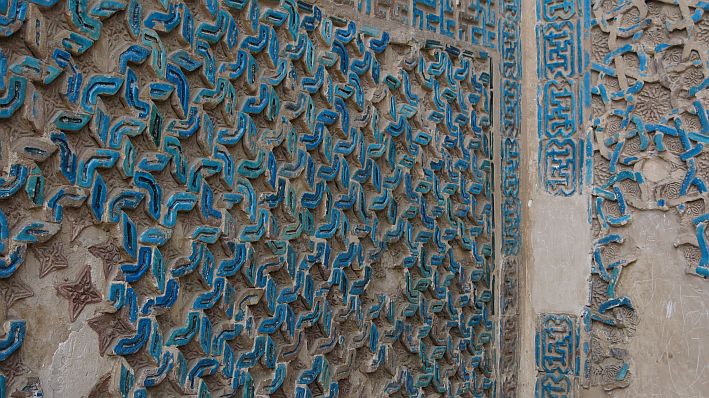
The wind was so strong again that I could barely move forward. There was a crosswind and with every truck that drove past me I was sucked into the middle of the highway; and after the truck had passed I would then be pressed back again nearly hitting the guard rail. It reminded me very much of my cycling trip to Iceland. The wind was always brutally strong there. The only difference was that there was no traffic and no guard rails in Iceland.
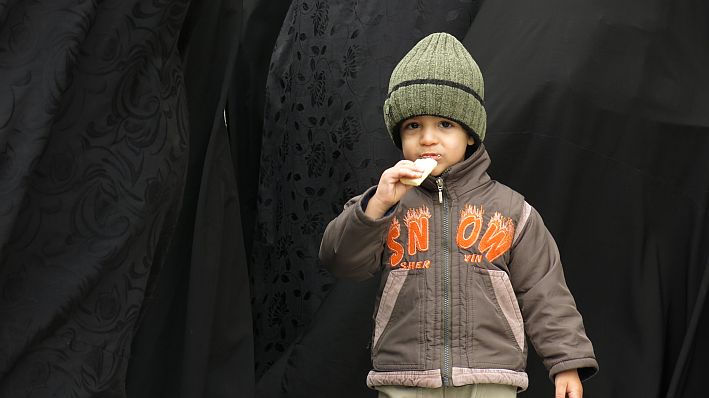
I decided to evade the problem once again and waited for better weather conditions in a totally shabby accommodation.
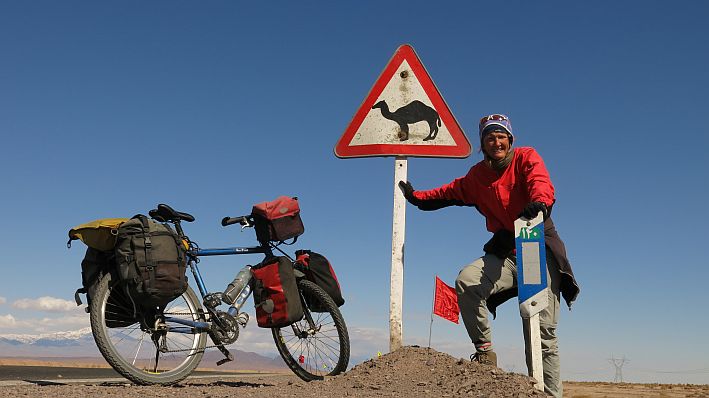
For the next few days, I could only ride on the main highway. There was no alternative. Because of Noo Ruz, traffic was endless. All of Iran was on its way to visit relatives. Everywhere, the people picnicked along the roadside; for a short lunch stop, they would put up their picknick tents and apparently enjoyed the noise of the super highway and the exhaust fumes to the fullest, because they were sitting right next to the side strip on the highway grilling their Kebabs.
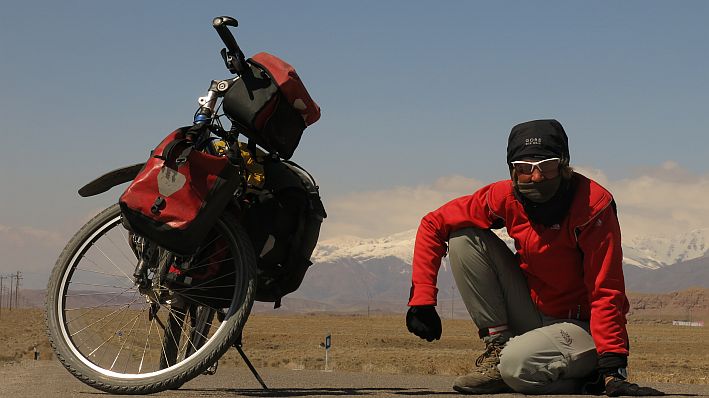
I was always able to find a place to sleep in the evening, either at a Helal Ahmar or with families where I knocked on the doors. They were all celebrating the New Year which, by the way, lasted a full 14 days. Everybody visited everyone else, and they all wished each other a Happy New Year.
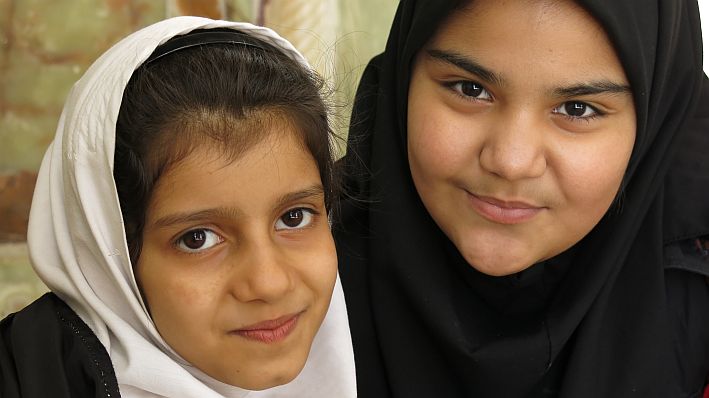
Every day I was given fruit, chocolate, tea, nuts, and even lunch. Sometimes food was handed to me directly from a moving car, or a driver would stop to give me their address and invite me to their home.
I met groups of pilgrims who had walked from Tehran to the holy city of Mashad. All of them marched along the hard shoulder of the highway.
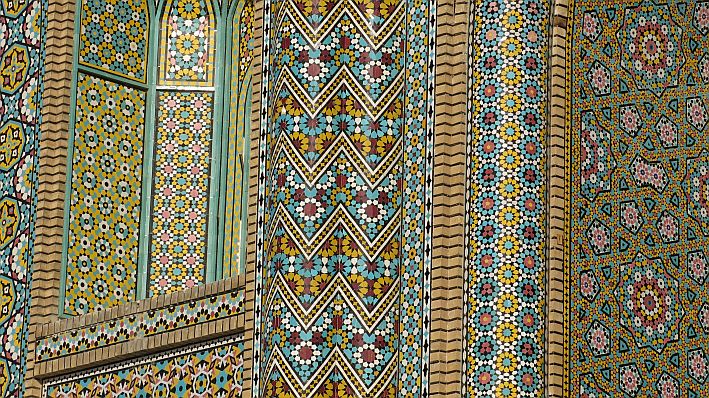
Time was getting short because my Iran visa was about to expire and my Turkmenistan visa had not even been requested yet, so I gave gas and trumped my personal daily record again managing 184 kilometers in one day.
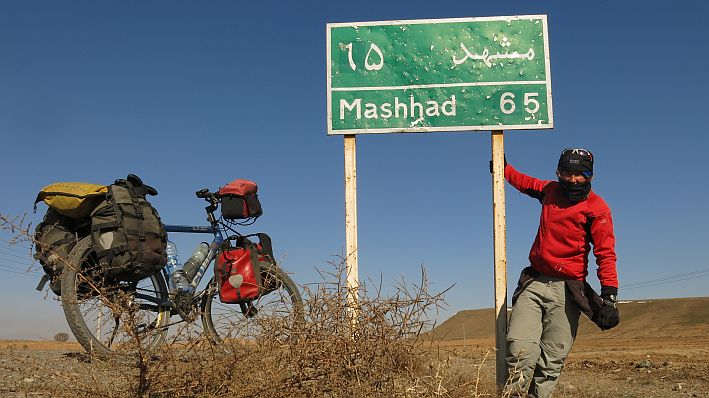
In Mashad, I stayed with Navid and his family and celebrated my 42nd birthday there. They spoiled me entirely and I was even given a birthday cake. On the same day, we drove to the Turkmen consulate and I applied for a transit visa. Unfortunately, as a tourist traveling alone, it was not possible to apply for more than 5 days transit through the country. The waiting period for its preparation was 7 days.
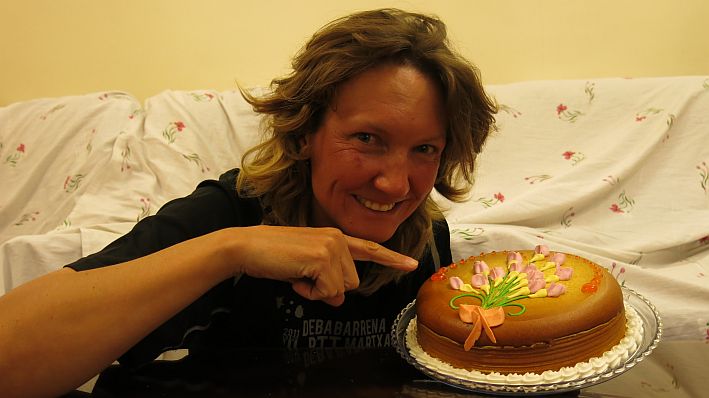
In Mashad I found a place out of the way; I had somehow enough of Iran. Noo Ruz was never-ending, and people came to visit and were served fruit and nuts. Sometimes, I even hid in a room so I wouldn’t have to tell my story again, which Navid would then have to translate for the umpteenth time.
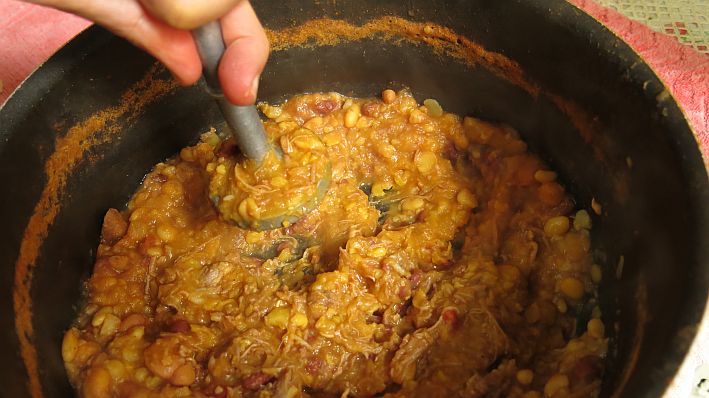
Abgoush. A stew of beans, potatoes and meat.
Navid’s father cooked the best food that I had eaten in all of Iran. Finally, there was something to eat other than the normal kebab, dry rice and soup. Unfortunately, the food was usually not served until midnight.
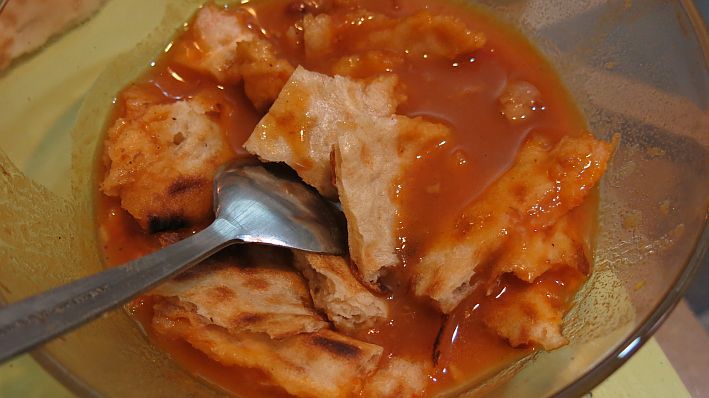
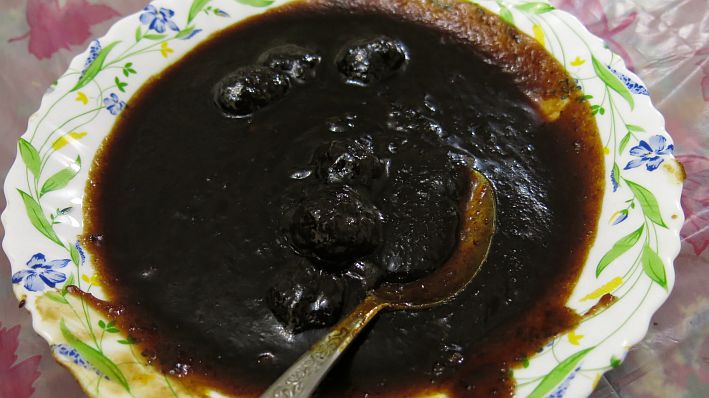
I didn’t want to miss the holy shrine of the Eman Reza. Because of it, Mashad is the holiest city in the country. It was a huge mosque with incredibly many people. Unfortunately, I wasn’t allowed to take pictures there.
I was irritated for a while when I heard a church bell ringing. The sound came from a bell tower in the middle of the plot of land where the mosque stood. How melodic and warm this bell sounded in comparison with the horrible, loud howling of the muezzin.
For me, the shrine provided a nice conclusion to an exciting time in a very interesting country.
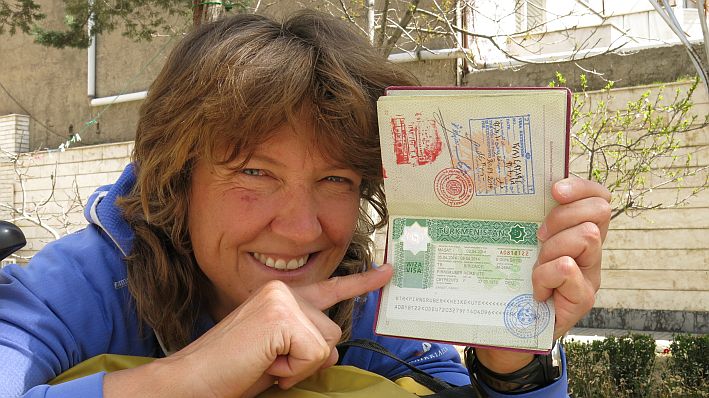
But now it was time for Central Asia. I was able to pick up my Turkmenistan visa as promised within seven days for $55 and I still had two and a half days to get to the border. I was surprised about the friendly staff and how smoothly it went because I’d only heard negative things about the consulate.
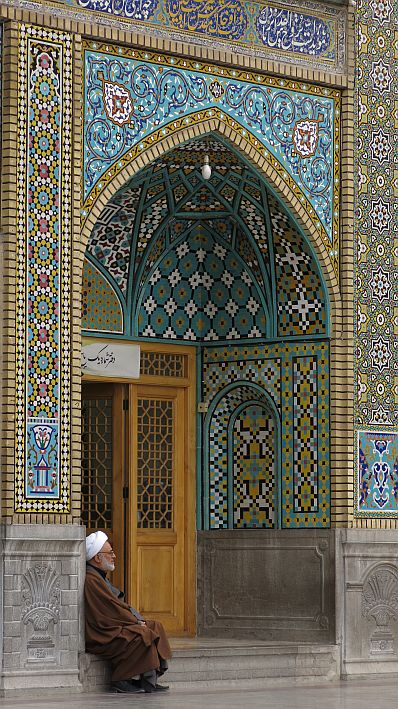
Until I arrived in Sarakhs, not much happened, except that I was intercepted by the police again on the way there. This time they really had good intentions. It was already dark when I arrived in a small town and they said that Iran is an Islamic state – too dangerous for a woman traveling alone to camp alongside the road. A few phone calls later, they found a room for me where I could spend the night alone. Super!
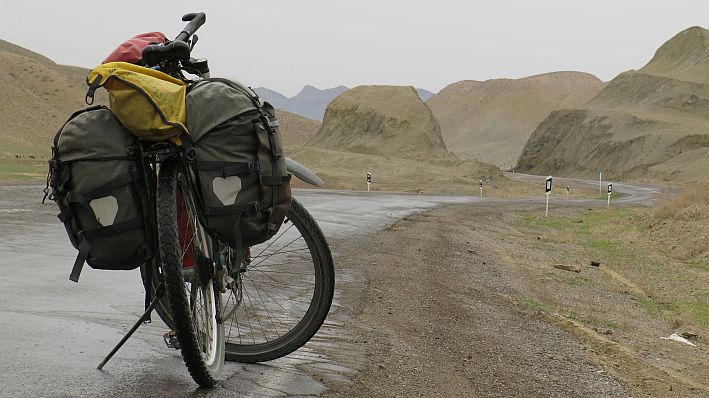
In the pouring rain I reached Sarakhs, the border town to Turkmenistan. I had only one last day before I was allowed to cross the border.
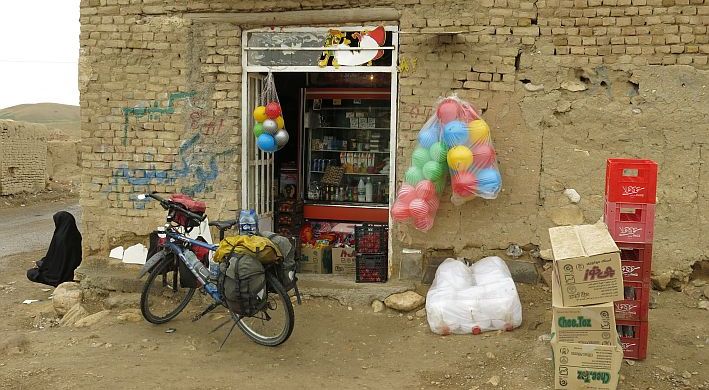
To sum it up, I would like to say a few words about Iran. Iran impressed me very much. I learned many new things; I tried to get to the bottom of many of their points of view, and I tried to understand the world in which the people live there.
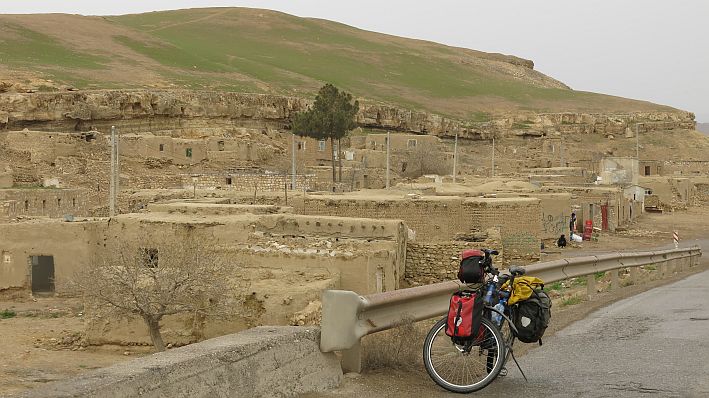
Even though I believe the Islamic culture in Iran is clearly more liberal for women than in other Islamic countries, life for a woman here is unfortunately associated with restrictions. But I also learned that many women enter into a self-inflicted dependence, because a wedding there costs a man a significant dowry, which at any time, the woman may request from him, even if it would drive him to ruin. During the marriage, the women continue to be financed fully by their husbands, because many women do not want to work themselves.
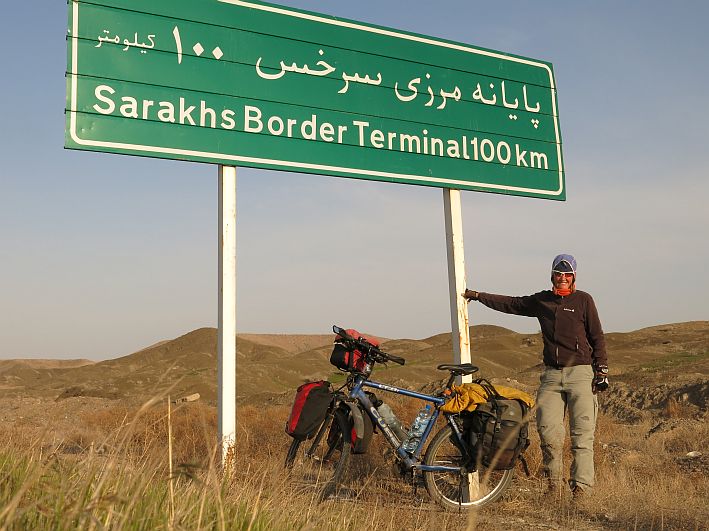
I learned that marriage is often not based on love, but is a kind of social duty, a business, a forced connection. The man buys the woman and she allows it. Therefore, the woman is treated in many cases as a product and is therefore not treated as an equal person, but rather as a subordinate.
I also learned to what extent money is in the forefront of a marriage. A woman would certainly not marry a poor man, because from the perspective of a woman, marriage for many is only a business transaction – an improvement in their financial situation – and for that reason alone, many women sell themselves.
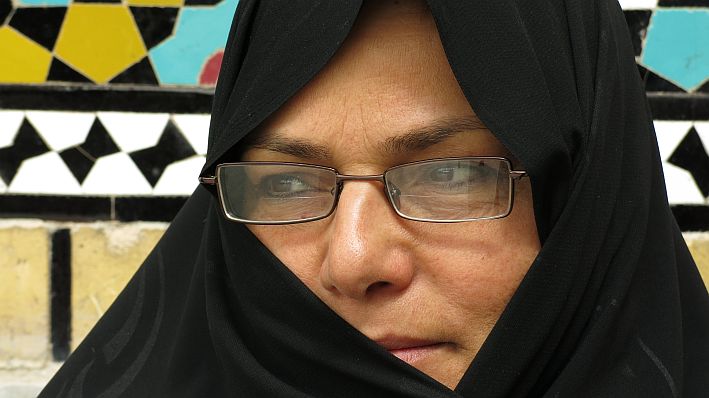
The environmental impact in Iran is frightening – not only because of the enormous amount of unfiltered exhaust fumes. No! But especially because of the permanent waste of gas in the homes as well. For example, at Navid’s house, the pot for the tea was on the hot stove 24 hours a day, so that at any time, tea water would be ready.
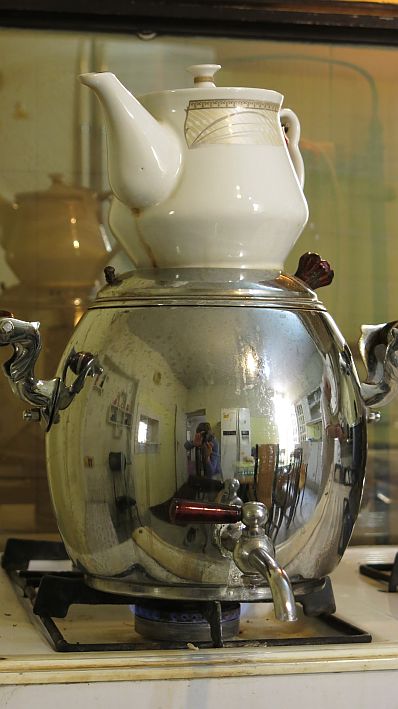
I’ve already written several times about the completely overheated rooms. On the route from Semnan to Mashad, the highway was completely lined with trash; plastic bags fluttered everywhere in the wind. The inner cities, however, are very clean. In addition, like so many other nations, they eat far too much meat.

Thank you Iran. Thanks to all the people who picked me up and cared for me so very kindly.
Tashakor.
But now, on to Central Asia, a new world is only a few miles from here and I’m looking forward to it immensely.
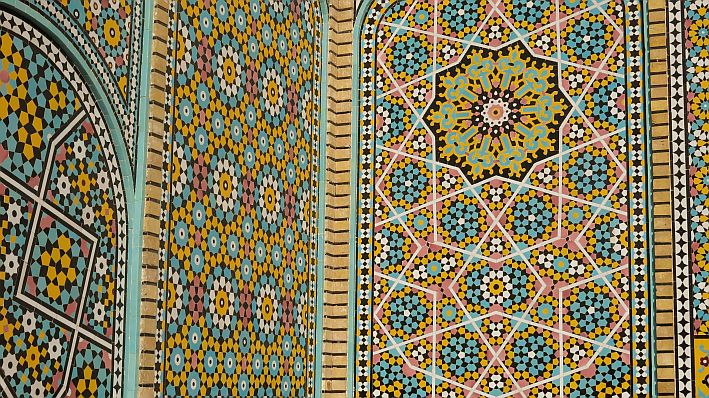
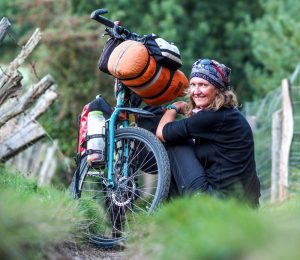







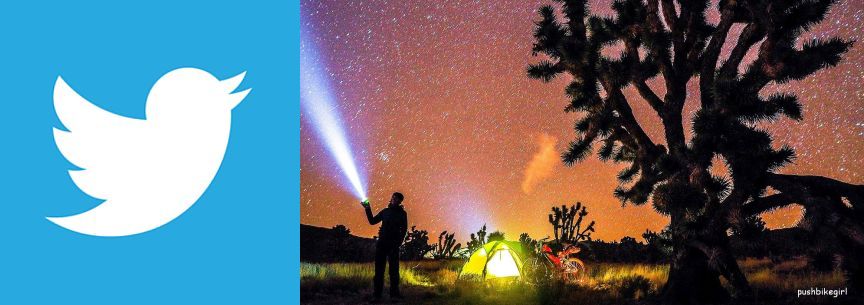




0 Comments